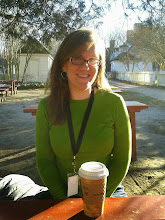For the past few days, I’ve been reading a book called Simple Church, by Thom Rainer and Eric Geiger. Eric Geiger is coming to talk to a conference event in a few weeks that some of our church staff is attending, so this is like homework. And if you happened to see my Facebook status earlier today, you already know that I am not happy about it.
It's not just the patronizing language or the vapid metaphors that make the whole thing read like a cheesy children's sermon. It's not just the chauvinism that blares through whenever the authors mention their wives, or the rampant biblical eisegesis in defense of their premise. OK, it is partially all of those things. But I have some actual questions, too.
The premise of the book is that simple churches--churches with a clear, streamlined process for making disciples--tend to be healthier. I don't completely disagree with this premise. I think there's probably a lot to be said for getting rid of outgrown or ill-conceived ministries, and eliminating special programs that turn out to be more for show than for effectively reaching and forming people. So I admit there's some validity to their argument, even if I do wish they'd given ME their research and let me write a book targeted at moderately intelligent readers. I also admit I haven't read the whole book yet, so it's possible my questions might be answered or opinions changed by the end.
I also don't disagree with their assumption of spiritual growth as process. What good Wesleyan could?
But I do wonder how well we can assign parts of that process to aspects of an individual's involvement within the life of a church. Most of the churches they rank highly have a model that looks something like: people come to worship and meet God, people join small groups and learn about living in community, people pick a ministry and serve.
But what if I don't come to church first? I can't find a welcoming small group or a community ministry as an invitation into a relationship with God? I can't come to church and get plugged into the congregation by joining a Saturday service event? I have to go through a small group first? And couldn't there be some value in having a wide variety of ministries for people to choose to be involved in--even if they do clutter up the calendar, even if they're not particularly streamlined? I'm simply not convinced that the process of salvation "from the first dawning of light in the soul till it is consumed in glory" (that's probably misquoted slightly, sorry Wesley) is as neat as a three-step program. This "simple church" idea seems to want to plug people into a machine that spits them out as disciples on the other side.
And what happens when I do get the service stage of my spiritual growth process? I graduate? I'm good to go? How does continuing sanctification factor into the life of the individual and the church? When I think of how worship, education, fellowship, and service contribute to growth and discipleship, I envision less of a line and more of a positive feedback loop.
And of course, what their data show is not technically that simple churches are healthier, but that they are more popular. It's about growth--attendance and baptisms and membership. And really, if the church really, really faithfully lived out its calling as the church and expected its members to do the same--don't you think there would be far fewer Christians, rather than more?
That's not to say that people are leaving mainline Protestant churches in droves due to our stringent views on discipleship. It's also not to claim that numbers aren't useful, because they do speak to relevance. But there's really no good way to quantify faithful, transformative ministry.
Still, I wonder how the study would change if we picked some different y-variables. What if we looked not at membership and attendance, but at ways churches positively impacted and transformed their communities? What if we looked at how much they made their little corner of the world look more like the Kingdom of God? I don't know what those variables would be, but I wonder if the x-variable would still turn out to be simplicity. Because if not, I want to know what it would be, and that's the way I would want to run my church.
